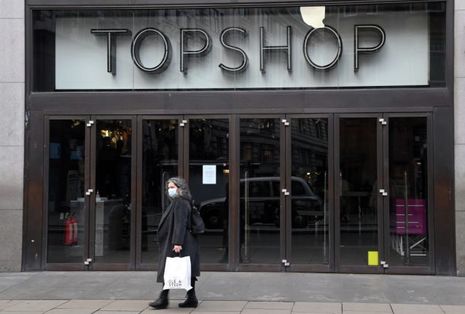How the rise of online shopping will accelerate capitalism’s contradictions
Claudia Davey believes that the trend towards e-commerce, signalled by the collapse of Arcadia and other high street stores, will only lead to more inequality and less accountability.

At the end of November, Arcadia collapsed. The retail giant, which owns high street stores such as Topshop, is in talks with potential buyers for its most popular brands. Coronavirus has decimated the high street, but it has only completed a process that has been occurring for years. The high street has long been asphyxiated by the growth of online retail, and the imminent closure of Topshop seems to be the ultimate concession of defeat. The immediate concern surrounding Arcadia’s collapse has involved its 13,000 employees and their pensions. This is a pressing issue but, as we witness the victory of e-commerce, we must also look at the bigger picture: what will an online market mean for us all?
“Winnings float to the top, to be creamed off by select individuals, while losses are forced down, to be shouldered by us all”
The blame for Arcadia’s failure has largely been placed on the company’s chairman, Philip Green. The self-styled ‘King of the High Street’, Green was once considered one of the country’s most successful businessmen. And yet Green has successfully done everything capitalism supposedly warns against. He has failed to adapt to the times: many have blamed Topshop’s fall on his unwillingness to rebrand towards an online market. Under his guidance, several businesses have crashed. Despite this, Green is by no means a ‘bad’ capitalist, as he still has a reported net worth of around £900 million. Green may be forced to plug the gap left behind in the Arcadia pension fund, but this will only make a negligible dent in his bloated wealth. The real losers are Arcadia’s employees, who face unemployment in a time of economic crisis, and the state, which will have to support those that fall through the cracks of lost pensions and unemployment. Green’s story shows exactly what neoliberal capitalism has made of our markets and societies. Winnings float to the top, to be creamed off by select individuals, while losses are forced down, to be shouldered by us all.
Now, when the crises of capitalism seem to be deepening, it is essential that we carefully question where our economic system is leading us. However, the velocity of online commerce makes this reflection unlikely. The internet is an intensifier. It may seem as if the online world offers an alternative to the in-person retail market, but it is really just the same story, only played at double-speed. For example, Topshop’s failure is mirrored in the story of online retailer Nasty Gal. Sophia Amoruso founded the company in 2006, and by 2012, annual revenue topped $100 million. Yet four years later, the company filed for Chapter 11 bankruptcy. Employees complained of being mistreated, with several suing the company for wrongful termination. Amoruso has since rebranded Nasty Gal’s collapse as a war story of tenacity and grit, using it to promote her workshops on being a woman in business. Even at her lowest point, with her wealth ‘decimated’, she was still worth an estimated $5 million. Nasty Gal was saved by fashion conglomerate Boohoo Group, but the company’s woes weren’t over. As recently as July this year, Boohoo was forced to look into its supply chain, when Nasty Gal’s merchandise was found in a Leicester factory that may have paid workers as little as £3.50 an hour. Although not Amoruso’s fault, as the company is no longer under her control, the story of Nasty Gal seems eerily familiar. Over little more than a decade, Nasty Gal had seen the rise and fall experienced by Topshop in a fifty year time span. Online retail repeats the same cycles as the real world, with all the same winners and losers. The only difference is that it’s happening faster.
However, the fact that we can even name and shame Green and Amoruso is a privilege which we must fight to keep in the online age. The labyrinthian nature of the online world makes it increasingly hard to understand who is behind, and therefore responsible for, online businesses. Recently, the brands that ousted Topshop and the like from the top of the market have faced competition from a new host of online stores. Sites such as SHEIN, Romwe and Rose Gal sell a cornucopia of clothes at cut-throat prices. The legitimacy of such sites has been repeatedly called into question. Customers complain about clothes being far different to how they are advertised, or orders never showing up. Perhaps what is most concerning is the seeming lack of real people behind these businesses. There is little insight into who actually owns or runs such companies; in 2019, El Mundo reported that the supposed founder of SHEIN may not even exist. Although poor performance and customer dissatisfaction are serious issues, a lack of clarity on ownership and control is the most dangerous aspect of e-commerce. With the ghostliness of online business revealed, any promise of true accountability disappears.
“A commitment to unrestrained capitalism and an increasingly deregulated system has bred a financial culture of concealment and evasion”
A long view must be taken on the aftermath of a purely online retail world. Online, the worst excesses of capitalism will only escalate. There may be more convenience, competitive pricing and choice, but there is also more confusion around where, and to whom, our money is going to. It seems that the internet is finishing the job that neoliberalism started several decades ago. A commitment to unrestrained capitalism and an increasingly deregulated system has bred a financial culture of concealment and evasion. This culture has created a world in which Philip Green’s wife can receive a $1.2 billion dividend from Arcadia, tax-free thanks to her Monaco residency. It has created a world in which the same Philip Green can be appointed as a government advisor, asked to examine state spending. Under the anonymity and opacity of the internet, this culture can only fester. In an online world, will we be able to criticise the next Philip Green? We will most likely not know who he is, or where he lives, or what else he owns. We may not even know that he exists. In the age of e-commerce, dreams of holding corporations to account grow increasingly distant.
 News / Cambridge academics sign open letter criticising research funding changes22 February 2026
News / Cambridge academics sign open letter criticising research funding changes22 February 2026 News / Student and union protesters hold ‘Trans Liberation Solidarity Rally’ 24 February 2026
News / Student and union protesters hold ‘Trans Liberation Solidarity Rally’ 24 February 2026 News / Union speakers condemn ‘hateful’ Katie Hopkins speech14 February 2026
News / Union speakers condemn ‘hateful’ Katie Hopkins speech14 February 2026 Features / Beyond the porters’ lodge: is life better outside college?24 February 2026
Features / Beyond the porters’ lodge: is life better outside college?24 February 2026 Theatre / Footlights Spring Revue? Don’t Mind if I Do!25 February 2026
Theatre / Footlights Spring Revue? Don’t Mind if I Do!25 February 2026









